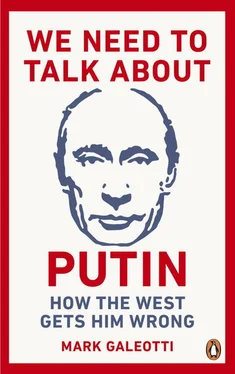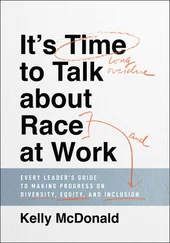Again, it’s all about the ponyatiye , the unspoken understandings. If you follow the unspoken rules, you should be OK. It’s when you cross them that you become not an enemy, but a traitor. Putin is a merciful autocrat. He doesn’t want to kill you – unless you force him to.
Chapter 10: Putin Is Just One Guy
In late 2015 and early 2016, I lived for a while in Kotelniki, an outer suburb of south-east Moscow, at the very end of the metro system. It was still being built all around me – the metro station had only opened a few months earlier, and there wasn’t even yet an asphalt path to it – and almost everyone else there seemed to be couples in their late twenties with young children. Typically, they were not well-heeled yuppies, but rather shop and office workers who had needed more space when their first baby came along, yet weren’t able to afford anywhere more central during the time of rocketing property prices. Having bought themselves a slice of high-rise commuter-belt suburbia, they found themselves after 2014 squeezed between their mortgages (many of which had been negotiated in euros, rather than rubles, when the exchange rate was favourable) and falling real wages. They were hurting: hunting for bargains, postponing making repairs to their flats, moonlighting as Uber drivers.
And they were complaining. The mayor’s office was backsliding on promised new amenities for Kotelniki. The banks were being inflexible about their mortgages. Child benefit was too low and the nearest kindergarten wasn’t ready yet. Thugs from the North Caucasus were hanging around the communal garages and the police weren’t doing anything about it. Someone from the next block had had a heart attack last week, and an ambulance had taken almost an hour to get there. They would complain about anyone and everyone – passionately, vitriolically and exhaustively – except for the president, the man notionally on top of this pyramidal ‘power vertical’. When I cautiously broached this, the response was an indifferent shrug. Eh, what could he do?
This is pretty sharply at odds with the usual Western image of Putin as the unchallenged and all-powerful master of his country. Putinism. Putin’s Russia. The temptation – as in this book – is to consider him to be the motive force behind the whole country, all eleven time zones and 144 million people of it. However, Putin is a synecdoche, as much as anything else a symbol, a figurehead for an often-varied collection of people and institutions. Indeed, it is a myth that he contributes to himself – in his autobiography, he wrote that in comparison to his previous jobs, ‘In the Kremlin I have a different position. Nobody controls me here. I control everybody myself.’
However, there is a big difference between being the man in charge, and actually exerting that power. After the Kursk submarine disaster in 2000, he went on television and admitted, ‘You know our country is in a difficult situation and that our armed forces are in a difficult situation – but I never imagined that it was in quite such a state.’ Since then, Putin has had to deal with a stream of disasters, both natural and man-made: air crashes, mine explosions, collapsing buildings, fires and floods. What is striking is how similar their causes and his responses. It is not that Putin doesn’t care; eyewitnesses at a meeting he had with the general director of the company that owned the Raspadskaya coal mine after two methane explosions had killed sixty-six people in 2010 saw him fly off the handle, slap him with a folder of documents, and lay into him in such obscene language that even the hardened presidential bodyguards seemed uncomfortable. But the circumstances were almost exactly the same as at a blast in Novokuznetsk in 2007 that killed 106, and one at Vorkuta in 2016 that would kill thirty-five.
In 2009, Putin publicly scolded oligarch Oleg Deripaska for the state of his plant in Pikalevo (‘Why has your factory been so neglected? They’ve turned it into a rubbish dump!’) and demanded that he settle £830,000 of wage arrears by the end of the day. In 2018, though, he was demanding that all ministries take seriously the problem of wage arrears, which had reached a nationwide total of £40 million. The fact that Putin keeps complaining about so many of the same issues, promising solutions, and losing face when they repeat themselves, suggests we should not take the myths of his hyper-presidential power at face value.
Putin is notoriously leery of being managed by his staff, but how can it be otherwise, especially when he is increasingly disengaged from government and his own country? In the early years, he would frequently travel and drop in, often unannounced, on a factory here and a city there. This was a terror for many local officials, as he would generally appear when some problem had emerged, precisely to present the image of the stern tsar defending his subjects from the corrupt or clumsy boyars, the aristocrats. He would give the factory owner, governor or minister a stern, finger-wagging dressing down on television, and money would suddenly be available to address the immediate crisis. Then there were also the marathon annual ‘Direct Line’ television sessions, in which the president would for hours answer calls from members of the public or selected guests. Of course, these were all stage-managed and pre-prepared, so he could avoid nasty surprises and impress the viewers by having all necessary facts and figures at his fingertips, but they had the symbolic function of connecting the shepherd of the nation with his flock.
These days, though, as the Russian proverb has it, ‘God is in his heaven, and the tsar is far away.’ Putin only goes to the Kremlin when he has to, preferring to stay at his palace at Odintsovo outside Moscow. He spends his mornings swimming and working out, and gets round to paperwork in the afternoon. If he wants to talk to anyone, he summons them to his presence. As for ‘Direct Line’, which he once seemed to enjoy, it increasingly appears a painful chore, as he listlessly responds to another question about whether Yelena’s husband Boris should let her have a dog, whether Putin should be cloned or whether it is illegal for Russian farmers to put Chinese-made GPS trackers on cows. (I didn’t make these up, by the way, and the answers were ‘yes’, ‘no’, and ‘I don’t know’, respectively.)
There are also whole areas of policy about which he doesn’t really care any more, instead largely leaving them to be handled by others, if they get handled at all. This may have been the case with the recent pensions issue that aroused such public anger. Similarly, I heard from someone in the Health Ministry that while Putin had clearly never been that engaged in health care (why should he, when he has the elite Central Clinical Hospital of the Presidential Administration at his disposal?), in his first two terms he had at least been dutiful – he would take the meetings, have read his briefing materials and ask good questions. These days, he is simply not interested, and if the minister himself wants a one-to-one meeting with the president, it can take months to schedule. Russia, meanwhile, has been rated as having the least efficient national health care system of any developed country, and its budget has actually fallen.
There are three questions that are worth asking here. The first is, has Putin run out of ideas? To the West, he looks active, assertive, aggressive, a warrior-tsar at the top of his game; we may see many of his gambits and adventures as failing, but we very much feel on the defensive. But if one steps back slightly, it is much harder to see any real endgame. Does he really believe that the West will cave in and give Russia the kind of status he craves, or even that it will implode? Or is it rather that he has no way back that would not mean, in effect, admitting defeat, something he is politically and personally unable to do? Besides, how much of this activity comes directly from his office and how much is generated by the political entrepreneurs who think it’s what he wants? One could almost see this as a science-fiction scenario in which the robots continue the war long after their builders are gone. Certainly my reading of the current mood in Moscow is that everyone is glumly digging in for the long haul, feeling that they face neither victory nor defeat, but a long and miserable geopolitical winter.
Читать дальше












